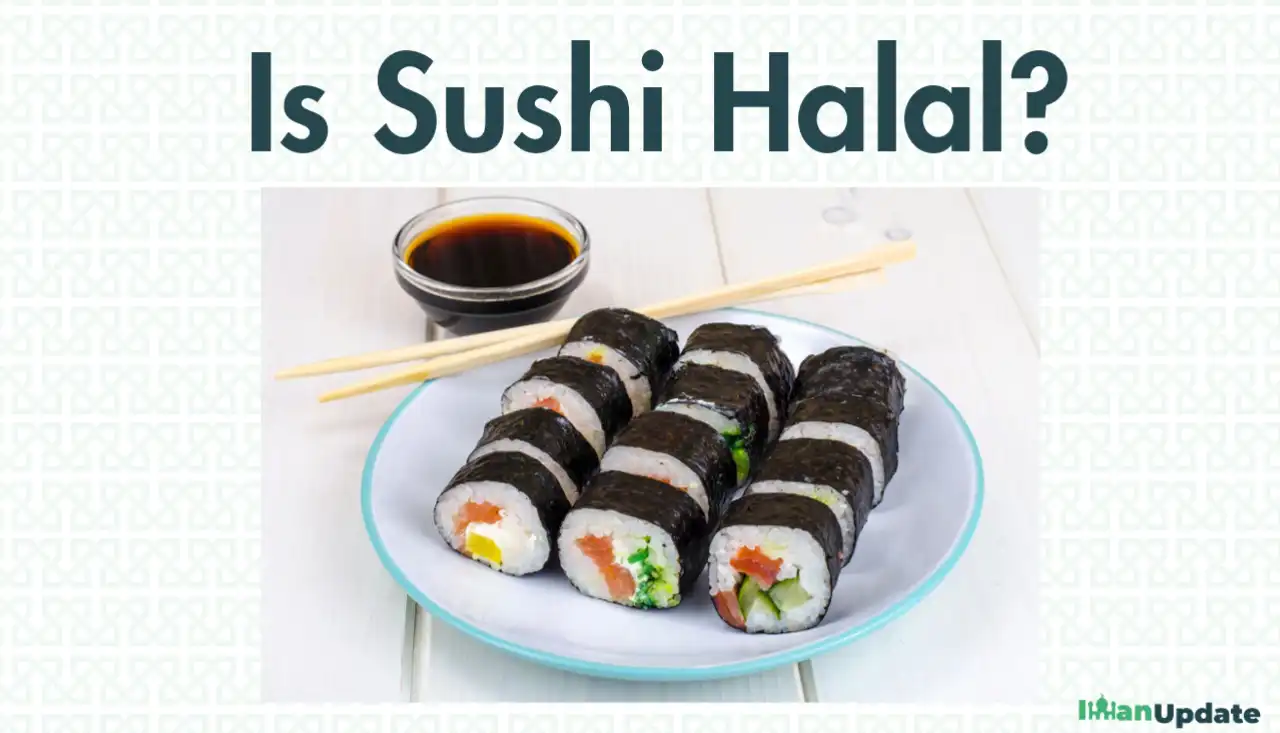Is Sushi Halal? A Complete Guide for Muslims

Sushi is a beloved dish known for its unique flavors, delicate preparation, and artistic presentation. But for Muslims, the question arises: Is sushi halal? With its origins in Japan and diverse range of ingredients, it’s essential to understand what makes sushi halal or haram.
In this blog post, we’ll explore the various factors that determine the halal status of sushi, common ingredients to watch out for, and provide tips on how to find halal sushi options.
Whether you’re a Muslim looking to expand your culinary horizons or simply curious about sushi’s halal status, this guide has something for you.
Is Sushi Halal? What Makes Sushi Halal or Haram?
The first thing to understand is that sushi can be halal, but only if it meets certain criteria. According to Islamic dietary laws, for any food to be considered halal, it must not contain forbidden (haram) ingredients, such as pork or alcohol.
Additionally, any non-seafood meat used in sushi, such as chicken or beef, must come from animals that were slaughtered in accordance with Islamic practices (zabiha).
In general, seafood, including fish and shellfish, is considered halal in Islam. As long as the sushi contains seafood that hasn’t been mixed with haram ingredients, it is permissible to eat.
However, not all sushi is created equal, and some ingredients commonly found in sushi may make it haram.
Ingredients to Watch Out For
One of the most common issues with sushi is the use of alcohol in certain components of the dish. For instance, mirin, a sweet rice wine, is often used in traditional sushi recipes to flavor the rice.
Since alcohol is haram in Islam, sushi prepared with mirin is not permissible. Additionally, some sushi rice is seasoned with rice vinegar that contains alcohol, further complicating the matter.
Soy sauce, a staple condiment for sushi, may also contain small amounts of alcohol, depending on the brand.
This makes it crucial to check labels or inquire at restaurants to ensure that the soy sauce you’re using is alcohol-free.
Many halal-friendly brands offer alcohol-free soy sauce, making it easier for Muslims to enjoy sushi without violating dietary restrictions.
Another potential issue is the use of non-halal meats in certain sushi rolls. While fish and seafood are generally halal, some sushi varieties include meat fillings, such as beef or chicken, which must be zabiha (slaughtered according to Islamic guidelines) to be permissible.
Always ask about the meat source if you’re ordering sushi rolls that contain these ingredients.
READ ALSO: Is Zebra Halal? A Comprehensive Answer
Halal-Friendly Sushi Alternatives
If you’re unsure about the halal status of certain sushi items, it’s always best to stick to simpler, more straightforward options.
There are plenty of halal-friendly sushi rolls available, and many sushi restaurants are willing to accommodate specific dietary requirements if you ask.
Some common halal sushi options include:
- Vegetable Rolls: Made with ingredients like cucumber, avocado, and pickled vegetables.
- Seafood Rolls: Featuring halal seafood such as shrimp, salmon, or tuna (without alcohol-based seasonings).
- Tamago (Egg Sushi): This Japanese omelette sushi is also a safe, halal option if it’s cooked without any non-halal additives.
These options are free from non-halal ingredients and can easily be enjoyed by anyone adhering to halal dietary guidelines.
Is Raw Sushi Halal?
One of the biggest points of contention among Muslims is the consumption of raw fish. Some scholars have expressed concerns over the health risks associated with consuming raw fish, such as the possibility of foodborne illnesses.
These scholars suggest that eating raw fish could be makruh (disliked) due to potential harm, advising that it should be cooked before consumption.
However, the majority of Islamic scholars agree that raw fish is permissible (halal) as long as it poses no direct harm to the consumer.
This ruling is based on the principle that everything is permissible unless explicitly prohibited by Islamic law. As long as raw fish does not lead to food poisoning or other medical issues, it is considered halal.
Islam teaches that anything harmful to the body is haram, as reflected in the verse: “Do not throw yourselves into destruction by your own hands” (Surah Al-Baqarah 2:195). Therefore, while raw fish is technically allowed, Muslims should exercise caution and ensure that the sushi they consume is fresh and prepared under hygienic conditions.
How to Ensure Your Sushi is Halal
Ensuring that your sushi is halal involves a little bit of research and communication with the restaurant staff. When dining out, always ask the chef or server about the ingredients used in preparing the sushi. Specifically, inquire about:
- The type of vinegar used in the rice (whether it contains alcohol or not).
- Whether mirin or any other alcohol-based seasonings are used.
- If there is any cross-contamination between halal and non-halal ingredients.
- The source of any non-seafood meats (e.g., beef or chicken) used in the rolls.
Some restaurants, especially those in Muslim-majority areas, may offer halal-certified options or be willing to adjust the ingredients to meet halal requirements.
Additionally, many sushi restaurants now offer vegetarian and alcohol-free options that cater to those with dietary restrictions.
Cross-Contamination Concerns
Another important aspect to consider is cross-contamination. Even if the sushi itself is made with halal ingredients, there is still a possibility that it could come into contact with non-halal items, such as pork or alcohol, during preparation. This can happen if the same utensils, surfaces, or fryers are used for both halal and non-halal dishes.
To avoid this, always ask the restaurant staff about their kitchen practices. Some places may have separate areas for preparing halal food, while others may not. It’s essential to clarify this before ordering to ensure that your sushi is truly halal.
Sushi and Islamic Teachings
IslamQA, a prominent Islamic website, states that all seafood is generally permissible in Islam, based on the principle that food from the sea is lawful (halal).
This includes both plants and animals from the sea, regardless of whether they are alive or dead when found. However, there are exceptions to this rule, such as water animals that are considered harmful, like crocodiles, frogs, otters, and turtles, which are forbidden to consume.
In the case of sushi, most of the seafood used is halal, including fish like salmon, tuna, and shrimp. The only thing to be cautious about is the additional ingredients and preparation methods that may make the sushi haram.
Common Misconceptions About Sushi and Halal Status
Many people believe that all sushi is automatically halal because it primarily consists of fish. However, as we’ve seen, several ingredients can render it haram, particularly when alcohol or non-halal meats are involved.
It’s also important to remember that sushi is not just about raw fish; today’s sushi often incorporates various elements, including rice, sauces, and vegetables, some of which may not be halal.
By clarifying these misconceptions, you can make informed decisions and enjoy sushi without compromising your faith.
Conclusion
In conclusion, sushi can indeed be halal, provided it is made with halal ingredients and prepared in a halal manner.
As a Muslim, it’s essential to do your due diligence by asking questions, checking ingredient lists, and ensuring there is no cross-contamination.
Many sushi restaurants now offer halal options or are willing to accommodate special requests, making it easier than ever to enjoy this popular dish while adhering to Islamic dietary guidelines.
With a little effort, you can enjoy the diverse flavors of sushi and expand your culinary experiences without compromising your faith. Always remember to check the ingredients, ask about preparation methods, and ensure that your sushi aligns with your halal dietary requirements.
Have you found any halal sushi restaurants that you love? Let us know in the comments below and share your experience!






